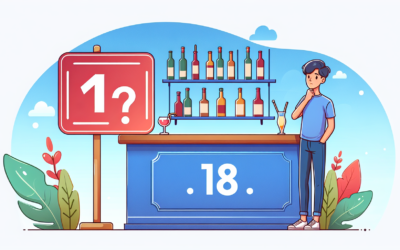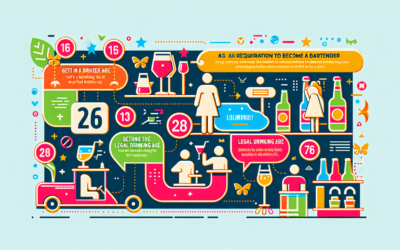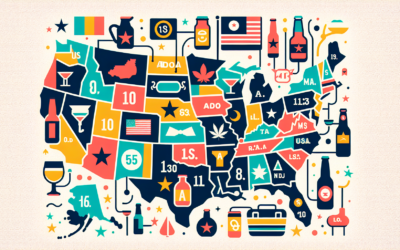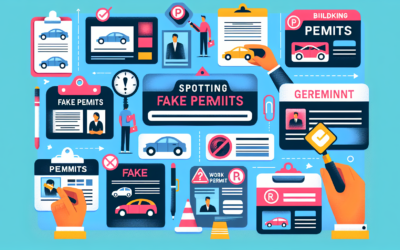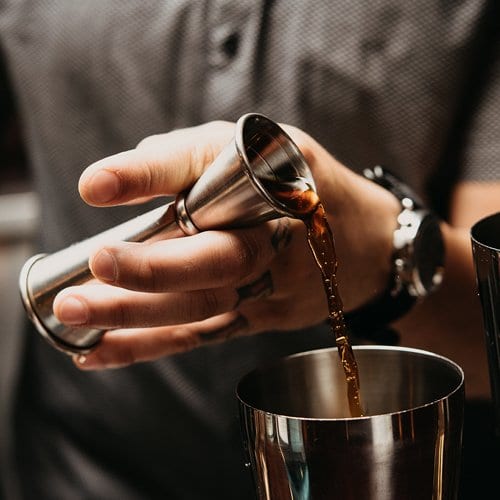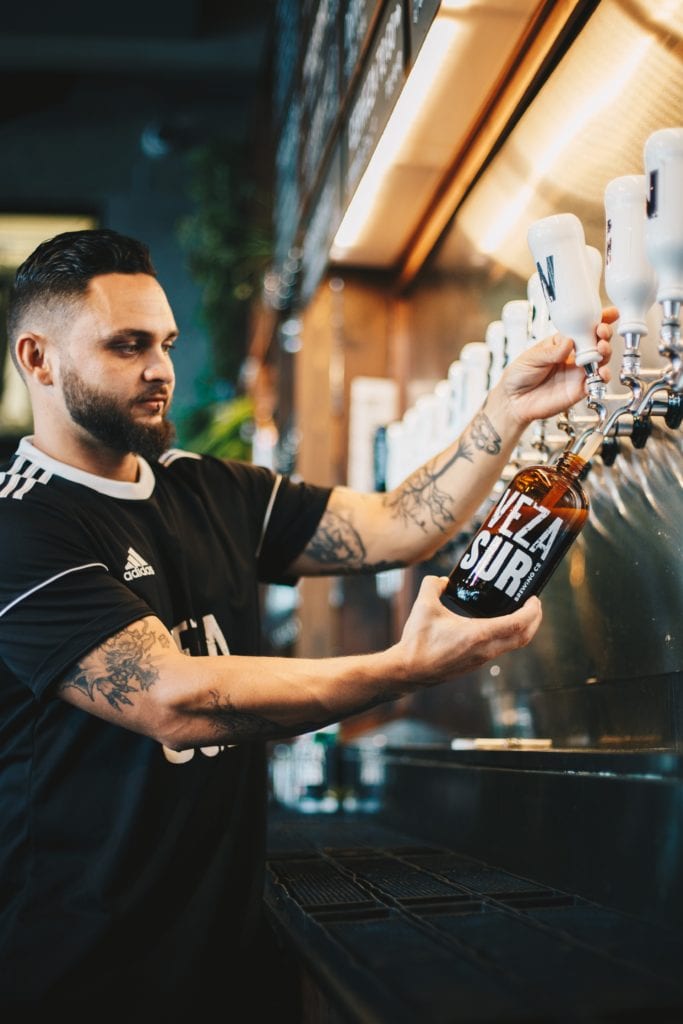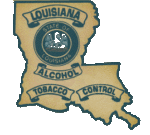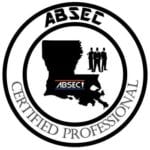Can You Bartend at 18? Understanding the Age Requirements Bartending can be an exciting and lucrative job for young adults. It offers an opportunity to work in a social environment, learn about mixology, and enhance customer service skills. However, one of the first...
Alcohol and Tobacco Class Online

Alcohol and Tobacco Class Online
Enroll Now
Get your Louisiana Responsible Vendor Car Card in about two hours.
ENROLL NOW
Introduction to The Responsible Vendor Program
Since its creation in 1997, the Louisiana Responsible Vendor Program has trained and permitted thousands of servers in the state of Louisiana. The Louisiana Office of Alcohol and Tobacco Control (ATC) licenses individuals from all three sections of the RV Program (Providers, Trainers and Servers). The three sections of the RV Program encompass the entire process of becoming a server in Louisiana. RV Providers create training programs to facilitate RV Program education through the use of licensed RV Trainers. By making RV Classes available on a regular basis, these RV Providers have successfully facilitated the education and training for the thousands of bartenders, waitresses, sales clerks and other personnel that have been licensed as RV Servers to sell alcohol and tobacco throughout the state. Many call this certification the Louisiana Bar Card.
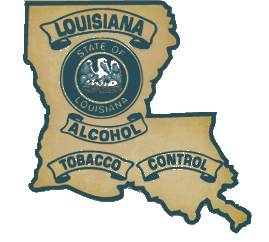
The program is governed and monitored by the Louisiana Alcohol and Tobacco Control (ATC). The retail locations at which licensed servers are employed are required to keep employment records on site for inspection by ATC Enforcement Agents. ATC Enforcement Agents also routinely check the compliance of licensed vendors and their servers. Servers found to sell or serve alcohol/tobacco products in violation of Louisiana law can be held liable in criminal or civil court depending on the violation. ATC Agents have begun issuing administrative citations directly to RV Servers for violations of Louisiana Title 26 violations.
The ATC also governs the providers who are authorized to provide training and certification in this program. A valid certificate can only be issued by a Louisiana ATC Authorized Vendor. The ATC publishes a list of providers that are authorized, which can be found here.
There are several companies advertising online that offer deeply discounted certification courses for the Louisiana ATC but are not authorized. It is your responsibility to make sure that the course you are taking is valid and accepted by the ATC.
Additionally, local town, city and parish ordinances may also govern the issuance and management of permits to serve alcohol and tobacco products.
Course Content
The content of the course is similar for all providers and a listing of the topics required to be taught is provided by the Louisiana ATC. The topics that will be covered are:
- Responsible Vendor Law
- Vendor Responsibilities
- Server and Security Personnel Responsibilities
- Louisiana Laws on Serving Alcohol and Tobacco Products
- Louisiana Laws on Serving Alcohol: Identification
- How to Detect False Identification
- ATC Regulation of Alcohol and Tobacco Sales to Minors
- Effects of Alcohol on Your Body
- Blood Alcohol Concentration
- Alcohol and Medication
- Alcohol and Driving Motor Vehicles
- Sale of Alcohol to Intoxicated Persons
- Pathways of Tobacco
- Effects of Tobacco on Your Body
- Tobacco Sales: Signage and Vending Machine Requirements
You will also learn:
- The responsibilities of a Responsible Vendor business owner
- The responsibilities of a server
- The responsibilities of security
- The appropriate age to purchase alcohol in Louisiana
- The appropriate age to purchase tobacco, alternative nicotine and vapor products in Louisiana
- What types of identification customers can show to purchase alcohol/tobacco products
- The effects of alcohol on the body and with medications
- Information on drinking while driving
Responsible Vendor Law

The server training courses shall include but not be limited to the following subject areas:
- Classification of alcohol as a depressant and its effect on the human body, particularly on the ability to drive a motor vehicle
- Effects of alcohol when taken with commonly used prescription and nonprescription drugs
- Absorption rate, as well as the rate at which the human body can dispose of alcohol and how food affects the absorption rate
- Methods of identifying and dealing with underage and intoxicated persons, including strategies for delaying and denying sales and service to intoxicated and underage persons
- State laws and regulations regarding the sale and service of alcoholic beverages for consumption on and off premises
- Parish and municipal ordinances and regulations, including but not limited to the hours of operation, noise, litter and other odrinances that affect the sale and service of alcoholic beverages for consumption on and off premises
- State and federal laws and regulations related to the lawful age to purchase tobacco products and age verification procedures and requirements
- The health risks and consequences associated with the consumption of tobacco products including but not limited to their addictive nature
- For security personnel, the handling of disruptive customers and customer altercations
A server or security personnel who violates alcohol or tobacco server law is subject to all of the following penalties:
- Suspension or revocation of their permit
- Monetary fine
- Criminal citations
A vendor who sells or serves to minors will not have its alcohol or tobacco permit revoked in the following instances:
- On a first sale of an alcoholic beverage by any server or security personnel to an underage or intoxicated person or the first illegal sale or service of a tobacco product by any server or security personnel to an underage person in any twelve month period
- On the first citation for consumption by a customer of alcoholic beverages on the premises of a Class “B” vendor in any twelve month period, unless the vendor had knowledge of the violation, should have known about such violation, or participated in or committed such violation
A vendor may not use as a defense the fact that he was absent from the licensed premises at the time a violation occurred if the violations are flagrant, persistent, repeated, or recurring.
ATC takes into consideration compliance with the responsible vendor program and other methods taken by the business owners to prevent the sale of alcoholic beverages and tobacco products to persons under their respective legal ages.
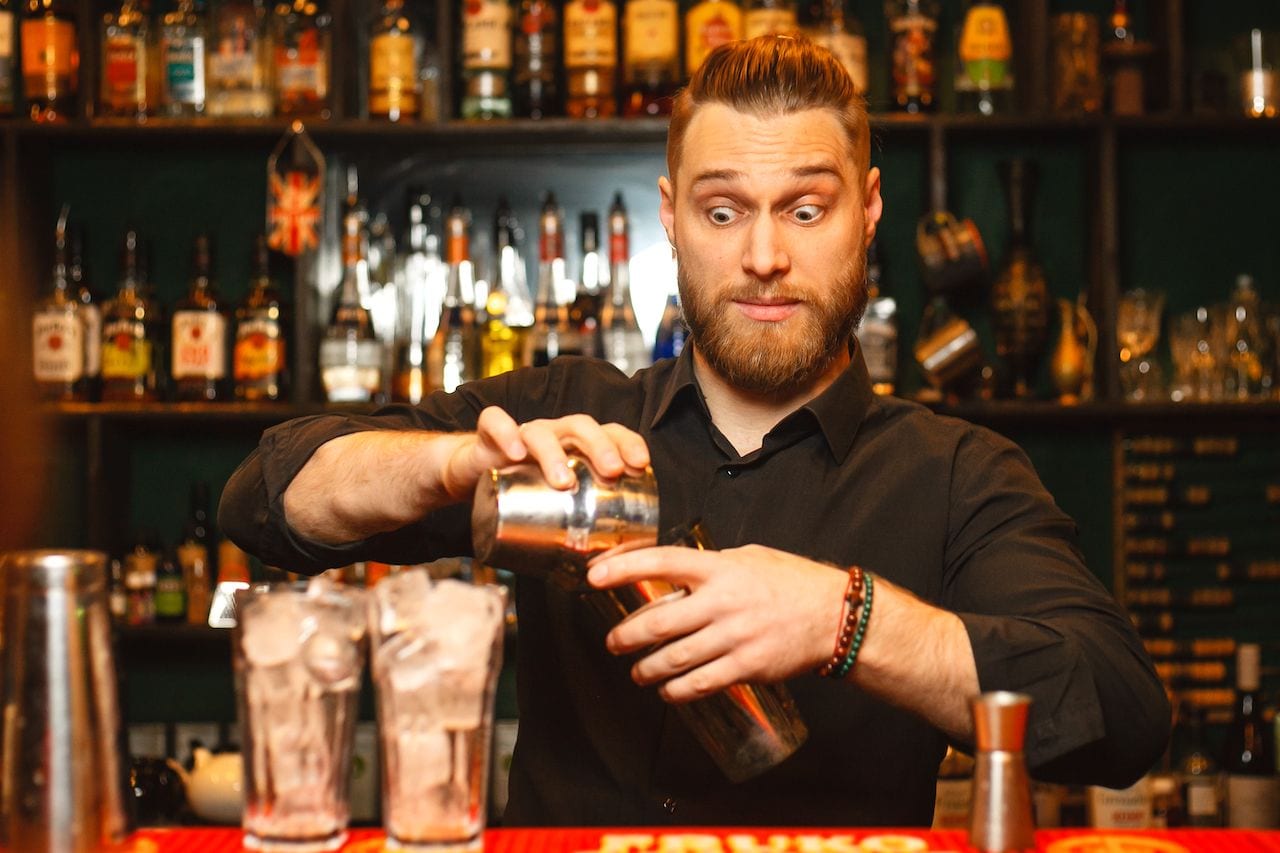
Responsible Vendor Servers
According to Louisiana law “any employee of a vendor who is authorized to sell or serve alcoholic beverages or tobacco products in the normal course of his or her employment or deals with customers who purchase or consume alcoholic beverages or tobacco products” must attend an RV Class and obtain an RV Server Permit or “bar card” within 45 days of their hire date. RV Classes are held on a regular basis throughout the state and are provided to individuals for a fee of $25 per person. The classes average 2 ½ – 3 hours and include a test which must be passed in order to receive your Responsible Vendor Server Card. You can get your Louisiana Bar Card online and receive a temporary certificate immediately following the course.
The retail locations at which licensed servers are employed are required to keep employment records on site for inspection by ATC Enforcement Agents. ATC Enforcement Agents also routinely check the compliance of licensed vendors and their servers. Servers found to sell or serve alcohol/tobacco products in violation of Louisiana can be held liable in criminal or civil court depending on the violation. ATC Agents have begun issuing administrative citations directly to RV Servers for violations of Louisiana Title 26 violations. If you have received an administrative violation, Click Here to access the ATC Prosecutor’s Page where you can obtain information about our administrative violation process.
Vendor Responsibilities
Q: I am one of the vendors defined in the program. What are my responsibilities?
A: As a Responsible Vendor, you must do all of the following to maintain your Responsible Vendor certification:
- Provide ATC with a completed affidavit
- Require all servers and security personnel to attend an approved server or security personnel training course within 45 days of the first day of employment. Server permits are valid for four years. You must ensure that all servers and security personnel attend refresher courses every four years
- Pay an annual fee of $50 per licensed establishment holding a Class A-General, Class A-Restaurant, Class B or Class C-Retail permit
- This fee is assessed on all new and all renewal applications for retail dealers of alcoholic beverages and/or tobacco products
- The fee funds the development and administration of the Responsible Vendor program
- Keep the handbook current (You may request updates from ATC)
- Provide new employees already Responsible Vendor certified with the rules and regulations applicable in the parish or municipality of your establishment’s location
- Maintain server and security personnel training records, which must include the following information for all servers and security personnel:
- Name of server
- Date of birth
- Social Security number
- Date of hire
- Keep a copy of the above server/security personnel records at your licensed premise at all times for inspection by ATC agents or other peace officers.
- Post signs on the licensed premise informing customers of your policy against selling alcohol and/or tobacco products to underage persons
Server and Security Personnel Responsibilities
Q: I am employed as a server or as security for a vendor. What are my responsibilities under this program?
A: Servers and security personnel have the following responsibilities under the Responsible Vendor program:
- Complete an approved responsible vendor training course within 45 days of employment
- Your RV card will be available on the ATC website 7-10 days after completion of the course. You may print/download your RV certificate on the ATC website
- Make your permit available for inspection immediately if asked by an ATC agent or other peace officer
- Keep your Responsible Vendor server certification current
- Your Responsible Vendor permit will expire on the last day of the month FOUR years after the month that you completed the Responsible Vendor course.
- To renew, attend and pass an approved Responsible Vendor course.

At ABSEC, we provide multiple methods of training and certification, including private courses, individual training, online training and customized training courses for all of your needs. ABSEC LLC is a Louisiana owned and based company. Get your bar card online Louisiana!
Attention to users’ needs and organizational policies place us ahead of our competitors. We have assembled a team of experts in this field who are more than able to provide the top level of instruction and consulting in this arena.
For those able to take our online course, we offer immediate certification as required by Louisiana State law. The bar card is issued by the State of Louisiana, but a temporary certificate is issued upon completion of the course and test, giving our students immediate access to written record of attendance and completion.
The alcohol server’s certificate is good for four years, but must be renewed in the manner it was received. (Full recertification by taking the course and passing the test)
Many students prefer to take the course online, instead of having to attend a course in person. Technology has allowed effective online training courses to finally compete with in person classes. The course is presented at the student’s pace and can be stopped and restarted, even on another device.
You can use your cellphone, laptop, PC, iPad or other smart device to access the course and complete the certification requirements. The course materials will also be made available to review at a later date.
One of the more common things out students share with us is that many of our competitors lack a telephone number on their website. This prevents students from contacting their provider when there is an issue or question. At ABSEC, we have a contact number that is answered 24 hrs a day, 7 days a week.
Many of the web listings are also for websites that are not authorized providers but are trying to sell you a course that gives you similar information, without the state required certification being issued afterwards. Before you enroll in any course, check the Louisiana ATC Website for a list of the currently authorized providers.
ENROLL NOW
ABSEC LLC
Authorized Provider by the Louisiana ATC
http://atc.la.gov
I need a Responsible Vendor Server Permit, how do I purchase the online course and take the exam?
- Purchase the online course.
- Take the online course.
- Take the online exam. You will not be able to take the online exam until you complete the online course.)
You will receive a Certificate of Completion upon passing the Online Exam. This Certificate of Completion will serve as proof of training until your Server Permit is issued and made available online by the Louisiana Office of Alcohol and Tobacco Control.
I lost my server permit. How do I obtain another copy?
How long is my server or security permit good for?
Responsible Vendor Server and Security permits expire every four years on the last day of the month in which you took the class.
Why should someone use the ABSEC Online Program?
The ABSEC online program incorporates Louisiana specific laws and regulations as required in all mandatory responsible vendor training programs in the state of Louisiana. By providing this state specific training, students receive the Louisiana Responsible Vendor Server Permit upon course and exam completion. Get your Louisiana bar card online today!
ABSEC is Louisiana based and Louisiana owned.
Do all of my employees who sell or serve alcohol need to be trained now?
Any person who sells or serves beverage alcohol or deals with customers who purchase or consume beverage alcohol must attend an approved server training class and receive a Server Permit issued by the Louisiana Office of Alcohol & Tobacco Control.
Servers must obtain a permit within 45 days from date of hire.
I took the alcohol server class but did not pass the examination, what do I do now?
Simple. You may retake the course and attempt the final examination by contacting us. https://absecllc.com/contact-us/
I was trained in responsible alcohol service in another state, is that training valid in Louisiana?
No, you must receive training specific to the State of Louisiana by attending an approved Responsible Vendor training program.
Who must attend class and obtain a Responsible Vendor Server Permit?
Any employee of a vendor who is authorized to sell or serve beverage alcohol in the normal course of his or her employment or deals with customers who purchase or consume beverage alcohol must successfully attend and pass a Responsible Vendor training course and obtain a Responsible Vendor Server Permit.
GET YOUR LOUISIANA BAR CARD ONLINE TODAY
Ready to get started?
Get your bar card online today!
Get in touch, or create an account
